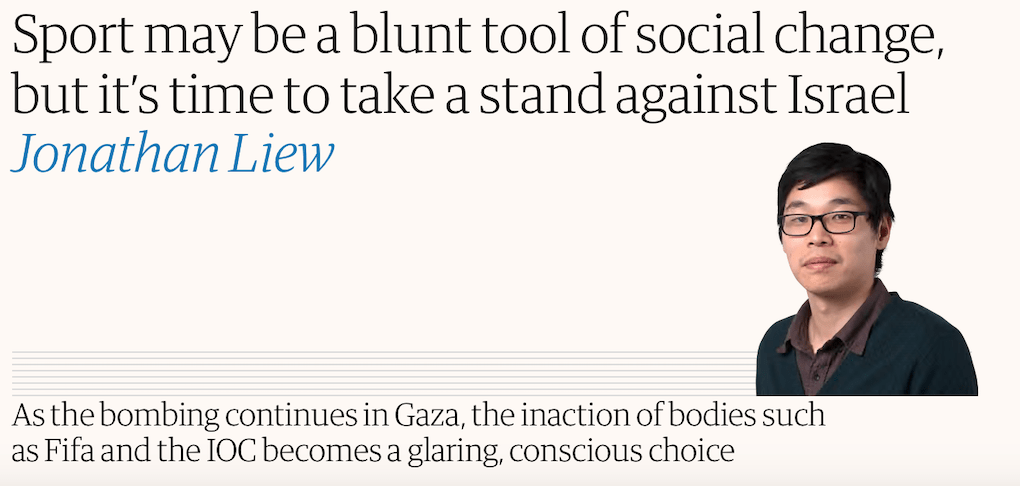Can someone check on Guardian sportswriter Jonathan Liew? It would appear he is not taking events in the Middle East terribly well, and one suspects the election of Donald Trump hasn’t helped, either.
I’ve noticed it for a while now, this trend of using the back pages – traditionally the fun pages – to foist desperate and uninformed sixth form bilge onto readers
‘I’ve been thinking a lot about hopelessness recently. Pretty much everyone I know is scarred and scared, bruised and hurting. And tired; so tired,’ he moans in his latest despatch, a thousand word diatribe on the evils of Israel – ‘an unhinged ethnonationalist far-right government’ – and, I think, although it’s not totally clear, the role of sport in countering it.
‘Even if sport is a blunt and pointless tool of social change, it must nonetheless be deployed. Because there remains – even in this warped, fucked fairground mirror of a world – a thing called right and thing called wrong,’ Liew writes, by the sound of it with tears in his eyes, omitting naturally to make any mention of Israeli hostages, Hezbollah or Iran, and only once, in passing, bringing himself to write the word Hamas.
‘How is it remotely possible to frame this horrific extravaganza of violence as the benign option and the resistance to it – even when it comes from the Jews themselves – as some kind of sublimated hatred, rather than the simplest act of conscience there is?’ Heavy stuff, Jonathan. But any chance you could tell us about, err, the footy?
When did sportswriters become such bores? I’ve noticed it for a while now, this trend of using the back pages – traditionally the fun pages – to foist desperate and uninformed sixth form bilge onto readers, for example about Brexit, climate change or the Tories. Liew is the worst offender, certainly, but he is far from alone.
It feels mean to single out individual offenders – although at the time I did think Times sportswriter Matt Dickinson’s assertion that Tyson Fury is a ‘very big man with a closed, bigoted mind’ with a ‘streak of violent malevolence’ was a bit strong. Dickinson, who later said he would no longer watch boxing on the basis it was ‘too brutal’, described Fury this way after the boxer – a committed Christian who left school at 11 – made some remarks about homosexuality you wouldn’t expect to hear at a north London dinner party.
When Liew writes about sport, he is brilliant. He has a rare gift for enabling the reader to see the game through the eyes of the athletes, or to describe sporting events in a manner that brings them to life almost more vividly than watching them live. The problem is all the other stuff – the social commentary stuff – for which he has no gift at all.
He sees racism everywhere and writes about it at every opportunity. According to Liew, for example, it is racist to describe a large or powerful footballer as a ‘beast’ or a ‘monster’ – common parlance in football – if they are black. What nonsense. He has implied, too, that John McEnroe might be racist because in 1981 he shouted the words ‘come on, boy’ during a match.
He also stopped just short – ‘there’s an incendiary word you could posit to describe all this, but I’m not going to use it’ – of accusing of racism anyone in the English cricket establishment who expressed concern about the manner in which fast bowler Jofra Archer was fast-tracked from the Caribbean into the national team. Jonathan Agnew – perhaps with some justification – in private called Liew a very rude word for this and was reprimanded by the BBC after Liew made the message public and complained.
Predictably, Liew is also a committed advocate for allowing biological males who claim to be trans to compete against women. He wrote: ‘Let’s say the floodgates do open. Let’s say transgender athletes pour into women’s sport, and let’s say, despite the flimsy and poorly understood relationship between testosterone and elite performance, they dominate everything they touch.
They sweep up Grand Slam tennis titles and cycling world championships. They monopolise the Olympics. They fill our football and cricket and netball teams. Why would that be bad? Really? Imagine the power of a trans child or teenager seeing a trans athlete on the top step of the Olympic podium. In a way, it would be inspiring.’
In February, Liew wrote a long piece arguing there was no need for parkrun gender categories – ‘the cruelty is the point here: the desire to forcibly out trans women, even when it might threaten their safety,’ he wrote.
In response, J.K. Rowling said Liew delighted in having ‘found an acceptable outlet for your disdain for women’s and girls’ sport.’ She tweeted: ‘We see you, Jonathan.’
Naturally, British sport’s most progressive voice of all, the sainted Gary Lineker – who readers will remember was only too happy to present the World Cup from Qatar, despite criticising the emirate’s human rights record – enjoyed Liew’s one-sided analysis of the conflicts in which Israel is currently engaged. ‘This’, he tweeted to his millions of followers, with a link to Liew’s piece.
One hopes Jonathan is not really as ‘scarred and scared, bruised and hurting’ as he claims. If he is, perhaps there’s a lesson to be learned: he should stick to sports writing. After all, it’s a big and scary world out there, and it’s certainly easier to discern ‘the thing called wrong’ from ‘the thing called right’ on the games pitch than it is on the battleground.








Comments